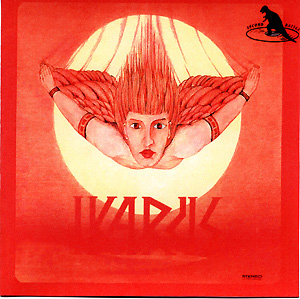|
|
|
01 |
Eclipse |
|
|
a.) Skyscrapers
b.) Sooner Or Later |
15:24 |
|
|
02 |
Mesentery |
|
|
|
06:11 |
|
|
03 |
The Raven (including "Theme For James Marshall") |
|
|
|
11:43 |
|
|
04 |
Early Bell's Voice |
|
|
|
07:43 |
|
|
|
| Studio |
Windrose-Dumont-Time studios |
| Country |
Germany |
| Cat. Number |
SB 032 |
| Spars |
DDD |
| Sound |
Stereo |
|
|
|
Wulf Dieter Struntz - organ, piano
Jochen Petersen - guitar, 12-string guitar, alto- and tenorsaxophone, flute, clarinet, vocals
Manfred Schulz - guitar, vocals, lead vocal on "Early Bel's Voice"
Wolfgang Kracht - bass-guitar, vocals, wings
Lorenz Kohler - lead vocals
Bernd Schroder - drums, percussion, accidents
Recorded at Windrose-Dumont-Time studios, Hamburg, February 1971
Recording and mixing engineers: Wolfgang Klaus and Henning Ruete
(p) 1971 Miller Int.
(c) 1995 Second Battle
Ikarus - "Ikarus" (1971)
An obscure but very good one-shot from Germany. Ikarus played progressive rock which sometimes were in the vein of Van Der Graaf Generator. The album opens with the 15-minute "Eclipse". Excellent and very powerful riffs and themes, but as many other German bands, the vocals could have been better. The sound is dominated by organ, flute, piano, saxophone and guitar. On some parts the band also used some real strings instead of mellotron. "Mesentery" is a great track, and the vocals are far better here than on the first track. "The Raven" is based on a poem by Edgar Allan Poe, and musically this is the most complex and experimental track on the album. The energetic saxophone parts will apply to any fan of Van Der Graaf Generator. The last track, "Early Bell's Voice", is perhaps the best. It consists mostly of wonderful instrumental parts, and the saxophone playing here sometimes reminds me of Catapilla. The track has a perfect early 70's feel to it, just as the rest of the album. A album that will suit most fans of 70's progressive.
Ikarus: Ikarus (1971)
Reviewer: Ben Miler | See all reviews by Ben Miler
Section: Reviews | Category: Music | Area: Germany
Print this review Email this review
Germany is even a bigger hotbed of prog rock than one might imagine. Sure everyone knows bands like Can, Ash Ra Tempel, Tangerine Dream, Amon Duul II, Faust, Neu, Kraftwerk, and similar bands (bands that might not always be considered prog, but are of interest to prog fans). But the countries was also full of more traditional symphonic prog acts like Eloy, Novalis, Grobschnitt, and the likes (all three were quite successful in their native country, by the way). Then there are tons of rare and obscure albums that simply disappeared through the cracks, and Ikarus is one of them. Ikarus is often described as one of the first progressive jazz-rock groups to come out of Germany, giving one the impression they might be that country's answer to bands like Colosseum. But actually they're much more in the Van der Graaf Generator vein, with vocals that bring to mind Peter Hammill (but without his dynamics), lots of sax, and Hammond organ. But the biggest problem lies in the lyrics. For example, the opening cut, "Eclipse" shows the band expressing environmental concerns, which I am very happy about, but with lyrics that go, "Save the nature/it's a treasure", it's really obvious that these guys are in dire need of brushing up on their English before using their pen. But regardless, they still put out some great prog rock. "Eclipse", despite the badly written lyrics, is a rather complex song, with some great sax work from Jochen Petersen and a great organ jam from Wulf Dieter Struntz. Real strings are also included as well (which are very well done and does not distract). I love the mood of this song, it's totally early '70s. "Mesentery" is the next song, the lyrics are a little better. Again, the more great organ work, with almost a psych feel to it. The strings pop up again near the end. "The Raven" features lyrics based on the poem by the same name from Edgar Allen Poe. The music here seems more unstructured than the first two songs, so it's more inaccessible, but after several listens, you'll find out it's another great piece. Some space rock tendencies pop up as well with the use of glissando guitar. The second half of the song is in a more mellow, atmospheric manner. The last one is "Early Bells Voice", again, with some more space rock tendencies, especially the Hammond organ at the end. While finding this album on LP is a bit difficult to come by, a small German label called Second Battle had reissued this on CD. I just love finding obscure gems that are simply amazing, and this self-entitled 1971 album from Ikarus is that example. So, aside from the lyrics, I can very highly recommended this to all prog rock fans, especially VdGG fans.
More Info
- Wulf Dieter Struntz: organ, piano
- Jochen Petersen: guitar, 12 string guitar, alto and tenor saxophones, flute, clarinet, vocals
- Manfred Schulz: guitar, vocals, lead vocal on Early Bells Voice
- Wolfgang Kracht: bass guitar, vocals
- Lorenz Kohler: lead vocals
- Bernd Schroder: drumms, percussion
